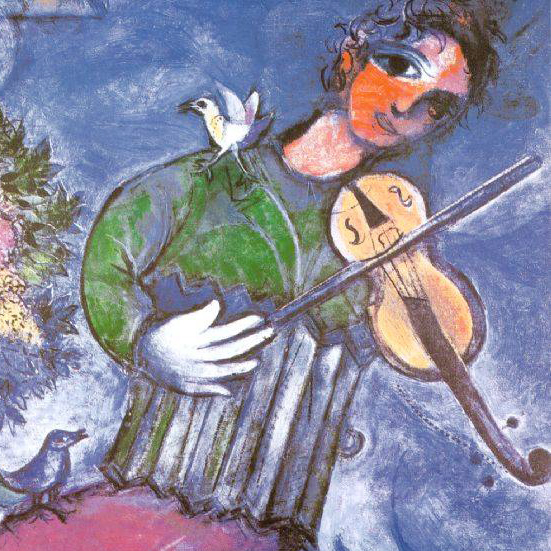Poetry Contest Award Ceremony
Saturday, January 13, 2018
7:45 PM | Auditorium, second floor
Marc Chagall, The Blue Violinist (detail), 1947
Contest theme:
An "Impossible" Unity
New York Encounter sponsored its second annual poetry contest to celebrate the theme of its 2018 event, An "Impossible" Unity. The Encounter strives to witness to the new life and knowledge generated by the faith, following Pope Benedict XVI's claim that “the intelligence of faith has to become the intelligence of reality.”
The Encounter’s poetry contest has invited all poets writing in English to submit up to 3 poems (maximum 40 lines each), related in some way to the theme, An "Impossible" Unity (see below). Our guest judge is internationally acclaimed and award-winning poet, Dana Gioia.
The winners were invited to read their poems on the New York Encounter stage at Metropolitan Pavilion, 125 West 18th Street during the 3-day festival which took place January 12-14, 2018. Winners also have the option of having their poems published on the New York Encounter website after the reading. (see below)
1st Place
The Steins: Blood Fate
by Elisabeth Murawski
Edith’s on her knees, braced
for verbal blows,
a retribution scene from Lear.
Considers the gospel’s
shocker: Who is my mother?
Frau Auguste struggles,
needling the convert:
what kind of daughter
sells short her roots? Sinks,
drowning in her chair:
why must he make himself God?
On the Day of Atonement,
they walk arm in arm
to the synagogue. Confusing
when Edith joins her
praying David’s psalm:
Hear, O Israel, thy God is one!
She wants to shake her!
Death spares Frau Auguste
the war, the yellow star,
the scandal of a daughter
dressed in Carmel’s wool.
Arrested, bound for Poland,
Edith says to Rosa
trembling in the station,
Come, we go for our people.
2nd Place
Chapter One, Verse Two
by John Poch
In the beginning was the word,
and the word was yes.
And the word tumbled out
through nothing, I guess.
And where it traveled,
that word made stones,
and flowers and trees
and bird-hollow bones.
In the beginning was the word
and the word was the truth,
and the truth became song
of tongue and of tooth.
Through path and forest
the song struck and rang.
Through the cool autumn air
how our past summer sang.
In the beginning the Word,
with eyes like a flame
on the face of the deep,
He calls out your name
like wind fills the dawn
and water the world
where you almost drown
but wash up uncurled,
where you nurse on your mother
and grow up to doubt
the word wanted world
to figure it out.
But soon echoes word
with more than a sound.
The song of it makes
grass grow from the ground.
You, yourself, are changed.
You are warm, you were cold.
You believe beyond Time
the still small voice of old
renews. It still hovers.
This is the word
and the poem where you suffer
and are loved and heard.
3rd Place
The Bat
by Austin Segrest
Inconspicuous at eyelevel,
faintly beating metronome,
standing upside down,
it hung from a fluorescent light’s
plastic screen.
The stairwell’s ugly-cute
thorn-thumbed fruit slipped the gloves
and squirmed away behind the screen,
clicking like a Geiger counter,
claws clattering.
A voice came through,
solicitous and a little amused,
patient but implacable.
The screen came off
like a roof lifting away.
Doomed delivered sinner,
it rose cradled like a prayer,
its sharp tiny white teeth
working out its estate
against Love’s rough glove.
Contest Theme: An "Impossible" Unity
We naturally yearn for unity and long to be part of a real community: life blossoms when it is shared.
And yet, we live in an age of fragmentation. At the social level, we suffer profound divisions among peoples and religions, and our country is ever more polarized along ideological lines, corroding our unity. At the personal level, we are often estranged from our communities, family members, and friends. When we discover that someone doesn’t think the way we do, we feel an embarrassing distance, if not open hostility, that casts a shadow on the relationship. As a result, either we become angry or we avoid controversial issues altogether, and retreat into safe territories with like-minded people.
But the disunity we see around us often begins within ourselves. We are bombarded by images of what we are “supposed” to be, but they generally do not correspond to who we really are. In fact, our truest self seems to escape us. The full scope of our humanity, with all its vast and profound needs and desires, may suddenly emerge, elicited by memories, thoughts or events, but usually quickly fades, without lasting joy or real change. And unless our relationships are rooted in the common experience of such humanity, we don’t even have real dialogue; we just chat, gossip, text or argue.
In the end, the unity we long for seems impossible.
But what if it is possible? How can it happen?
"You know it well: you can’t manage a thing; you’re tired; you can’t go on. And all at once you meet the gaze of someone in the crowd—a human gaze—and it’s as if you had drawn near to a hidden divine presence. And everything suddenly becomes simpler." –Andrei Tarkovsky
Submission deadline: November 7, 2017
Submissions of previously unpublished poems may only be made online via Submittable.
For the purpose of blind judging, submitters must not include their contact information in their submitted file or in their file name.




